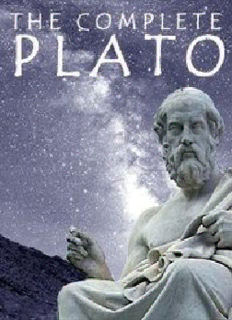
The Complete Plato PDF
Preview The Complete Plato
The Complete Plato Plato (Translator: Benjamin Jowett) Published: -347 Categorie(s): Non-Fiction, Human Science, Philosophy Source: http://ebooks.adelaide.edu.au/p/plato/ About Plato: Plato (Greek: Plátōn, "wide, broad- shouldered") (428/427 BC – 348/347 BC) was an ancient Greek philosopher, the second of the great trio of ancient Greeks –Socrates, Plato, originally named Aristocles, and Aristotle– who between them laid the philosophical foundations of Western culture. Plato was also a mathematician, writer of philosophical dialogues, and founder of the Academy in Athens, the first institution of higher learning in the western world. Plato is widely believed to have been a student of Socrates and to have been deeply influenced by his teacher's unjust death. Plato's brilliance as a writer and thinker can be witnessed by reading his Socratic dialogues. Some of the dialogues, letters, and other works that are ascribed to him are considered spurious. Plato is thought to have lectured at the Academy, although the pedagogical function of his dialogues, if any, is not known with certainty. They have historically been used to teach philosophy, logic, rhetoric, mathematics, and other subjects about which he wrote. Source: Wikipedia Also available on Feedbooks Plato: The Republic (-380) Apology (-400) Symposium (-400) Charmides (-400) Protagoras (-400) Statesman (-400) Ion (-400) Meno (-400) Crito (-400) Laches (-400) Note: This book is brought to you by Feedbooks http://www.feedbooks.com Strictly for personal use, do not use this file for commercial purposes. About this Publication This publication was adapted from the web edition published by eBooks@Adelaide (http://ebooks.adelaide.edu.au/p/plato/), which is part of the online ebook library of The University of Adelaide Library at the University of Adelaide in South Australia. That edition was rendered into HTML by Steve Thomas and the works were last updated in either 2003, 2006, or 2007. The dialogues of Plato in the web edition are reproduced in this compilation under a Creative Commons License, and ergo this publication falls under the same license. The English translations by Benjamin Jowett were originally featured in Jowett's own 3rd Edition of the Dialogues of Plato in 1891, and today may be found at multiple websites throughout the Internet. The University of Adelaide Library is located on North Terrace in Adelaide, South Australia 5005, AUSTRALIA. It may be reached by telephone (+61 8 8303 5372), fax (+61 8 8303 4369), or email ([email protected]). The license (http://creativecommons.org/licenses/by- nc-sa/2.5/au/) states the following: You are free to copy, distribute, display, and perform the work, and to make derivative works under the following conditions: you must attribute the work in the manner specified by the licensor; you may not use this work for commercial purposes; if you alter, transform, or build upon this work, you may distribute the resulting work only under a license identical to this one. For any reuse or distribution, you must make clear to others the license terms of this work. Any of these conditions can be waived if you get permission from the licensor. Your fair use and other rights are in no way affected by the above. Compilation and organization of this publication, and creation of the book cover, is all courtesy of [email protected]. To learn more about Plato, his works, and Benjamin Jowett, check out Wikipedia (but only trust what you can verify). A note should be made that none of the writings have been edited from its online source, except for some minor case changes in lettering. However, this collection does not feature the introductory and analyses of Benjamin Jowett for the containing dialogues. Any errors found by readers are the fault of eBooks@Adelaide, and should be reported to them. The reader may also note some inconsitencies in the presentation of the text, such as some works featuring names in italics rather than all caps in dialogues. Table of Contents The Complete Plato All books translated by Benjamin Jowett Part 1: Early Dialogues The Apology Crito Charmides Laches Lysis Euthyphro Menexenus Ion Gorgias
Description: